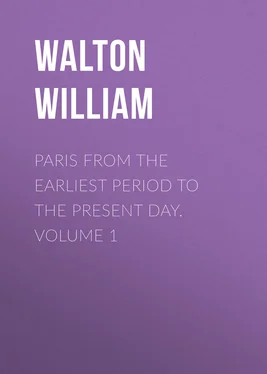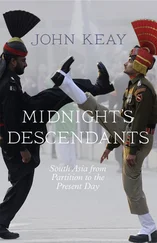William Walton - Paris from the Earliest Period to the Present Day. Volume 1
Здесь есть возможность читать онлайн «William Walton - Paris from the Earliest Period to the Present Day. Volume 1» — ознакомительный отрывок электронной книги совершенно бесплатно, а после прочтения отрывка купить полную версию. В некоторых случаях можно слушать аудио, скачать через торрент в формате fb2 и присутствует краткое содержание. Жанр: Путешествия и география, История, foreign_edu, foreign_antique, foreign_prose, на английском языке. Описание произведения, (предисловие) а так же отзывы посетителей доступны на портале библиотеки ЛибКат.
- Название:Paris from the Earliest Period to the Present Day. Volume 1
- Автор:
- Жанр:
- Год:неизвестен
- ISBN:нет данных
- Рейтинг книги:5 / 5. Голосов: 1
-
Избранное:Добавить в избранное
- Отзывы:
-
Ваша оценка:
- 100
- 1
- 2
- 3
- 4
- 5
Paris from the Earliest Period to the Present Day. Volume 1: краткое содержание, описание и аннотация
Предлагаем к чтению аннотацию, описание, краткое содержание или предисловие (зависит от того, что написал сам автор книги «Paris from the Earliest Period to the Present Day. Volume 1»). Если вы не нашли необходимую информацию о книге — напишите в комментариях, мы постараемся отыскать её.
Paris from the Earliest Period to the Present Day. Volume 1 — читать онлайн ознакомительный отрывок
Ниже представлен текст книги, разбитый по страницам. Система сохранения места последней прочитанной страницы, позволяет с удобством читать онлайн бесплатно книгу «Paris from the Earliest Period to the Present Day. Volume 1», без необходимости каждый раз заново искать на чём Вы остановились. Поставьте закладку, и сможете в любой момент перейти на страницу, на которой закончили чтение.
Интервал:
Закладка:
William Walton
Paris from the Earliest Period to the Present Day; Volume 1
INTRODUCTION
IF the capital of the French nation, situated on the river Seine, were simply the most beautiful, the wittiest, wickedest, and most artistic of towns, if—as has been so often asserted (and not exclusively by the citizens thereof)—the most commonplace and the most brilliant of human manifestations alike take on new qualities, texture, and interest the moment they become Parisien, then, indeed, would this city be entitled to be considered only with that mild offence which is the proper intellectual attitude before all so-claimed earthly superlatives. But Paris is by no means to be so disposed of. The very peccability of her wit is demonstrated by the extravagant claims which it permits itself. No God-given institution proclaims itself as such,—at least, noisily. It is the shadings to this brilliant picture, the exceeding width and depth and blackness of the sun-spots on this luminary of civilization, which relieve us from any easy toleration and compel us to the liveliest attention. One of her many qualities is that of representing and, too often, of acting for the whole country,—indeed, la centralisation is one of the four great evils (the others being the abuse of alcool , la pornographic , and the stationary birth-rate) which are recognized by its own citizens as menacing the nation. So that, in a general way, for both good and bad, Paris reads France.
Well, the heights and depths which we are called upon to contemplate are not unendurable, but they are certainly in many respects unexcelled. "France," says one of her most eloquent and dignified historians, "has justly been termed the soldier of God;" "Other continents have monkeys," says a learned German philosopher; "Europe has the French." Any community or locality which offers, or is considered by intelligent observers to offer, such a range as this, is certainly worthy of high renown and deep research, and it is not too much to say that Paris justifies her fame. Within her walls the human mind has displayed its loftiest development, and the human passions their most insane excesses; her art and her literature have erected beacon-lights for all the ages to come, and have but too frequently fallen into the depths of more than swinish filth; her science of government has ranged from the Code Napoléon to the statutes of Belial himself; her civilization has attained an elegance of refinement unknown to the Greeks, and her cigars and lucifer-matches are a disgrace to Christendom!
Happily, as in several other human institutions, there is more of good than of bad. The so-called "seamy side" of cities is not like that of flour-bags,—equal in extent and importance to the fair outer surface that meets the eye. Much as has been published of the depravity of Paris, it is not that, but the splendid activity of her material and intellectual civilization, the serious confronting of the heavy problems of humanity, the intelligent accumulation of the treasures of the mind and the hand, legislation, literature, art, science, that impress the intelligent visitor. Moreover, it is the annals of unhappy nations only that are said to be interesting, and it is impossible that a quick human interest should not attach to the contemplation of this capital which has attacked so many problems, maintained so many struggles, and endured such crushing reverses. In the light of her most troubled history the import becomes clear of the galley on her shield, and her motto: " Floats, but sinks not. " But few capitals have been more frequently, apparently, on the point of being submerged. Even as these lines are being written, it is agitated by the protracted and cumulating effects of a military and social agitation which, in the language of the President of the Cabinet of Ministers, "is deplorable, which paralyzes all commerce and creates a situation intolerable to all."
LNDEED, it may be said that the present moment is the most critical, the most dramatic, in the long history of the city and the nation, and that an entirely new interest will henceforth attach itself to this crowned capital which sees herself in the inevitable future forever uncrowned. Never before has the pitiless march of events, the pitiless accumulation of irrefutable evidence, the testimony of so many observers, at home and abroad, so seemed to demonstrate that all the methods of government had been exhausted, and that the nation had attained her summit of power and was doomed to steady decline. Down to Louis XIV, her hope was thought to lie in the consolidation of the royal authority and the suppression of the feudal power of the nobles; down to 1789, in the tiers état and the States-General; after the Commune of 1871, in the maintenance of a Republic supported by universal suffrage. The ideals of 1830 and of 1848 have been practically attained; there are, finally, no new and more liberal political expedients to hope for,—and never has France seen herself so distanced by her neighbors. Her contemporary literature groans with the accumulation of these facts—from the ineptitude of her rulers, national and colonial, down to the dependence upon the foreigner for wood for her street pavements and the canned provisions for her army. Behind that "gap in the Vosges" upon which, as one of her statesmen remarks, she cannot forever fix her gaze, she sees her great and hated rival doubling in power. In 1860, Germany had the same population as France; to-day, she has that of France and Spain combined. "Never has such a displacement of power been so quickly produced between two rival peoples. And no one among us seems to regard it, though not one of the problems which torment us is as grave as this one. Our agriculture, our industry, our commerce decline; we seem to be in decadence! How could it be otherwise? There are, in the neighboring hive, beyond the Rhine, sixteen millions of workers who were not there forty years ago,—that is the explanation of the progress of our neighbors as well as of the stagnation of our own activity. All the more that the quality of the French tends to diminish with their quantity; … we can foresee the day when there will be two Germans against one Frenchman, and this prospect fills us with fear for the future of our country, for we cannot comfort ourselves with illusions, we cannot believe in the perpetual peace, we know that history is a Vie Victis continual."
Therefore, let us hasten to contemplate this great and most admirable Babylon before Cyrus comes.
Paris, Rue Boissonade.
INTRODUCTION
GALLO-ROMAN AND PRE-MEDIÆVAL
PERIODS
COTOCIA, says that somewhat inexact geographer, Strabo, "is the city of the Parisii , who dwell along the river Seine, and inhabit an island formed by the river." Ptolemy, who has been thought to have been somewhat better informed concerning the Parisii than with regard to any of the other small tribes of Gaul, calls their capital Lucotecia; but both they and their town appear for the first time in history fifty-three years before the birth of Christ, when Cæsar, in his Commentaries , relates, himself, that he summoned a general assembly of the Gauls at Lutetia, the capital of the Parisii. At this date, he was already master of the greater part of the country now called France. More than four hundred years later, Julian, surnamed the Apostate, nephew of Constantine the Great, after having passed more than two years in this city, which he called "his dear Leucetia," was proclaimed emperor here by his soldiers, who refused to obey the orders of Constantius and return to the East. It is surmised by the scholars that the imperial author of the Misopogon adopted this form of the name of the town on the Seine through an affectation of deriving it from the Greek, in which language he wrote, and, as is still evident in those of his works which have survived, in a style remarkably pure.
Читать дальшеИнтервал:
Закладка:
Похожие книги на «Paris from the Earliest Period to the Present Day. Volume 1»
Представляем Вашему вниманию похожие книги на «Paris from the Earliest Period to the Present Day. Volume 1» списком для выбора. Мы отобрали схожую по названию и смыслу литературу в надежде предоставить читателям больше вариантов отыскать новые, интересные, ещё непрочитанные произведения.
Обсуждение, отзывы о книге «Paris from the Earliest Period to the Present Day. Volume 1» и просто собственные мнения читателей. Оставьте ваши комментарии, напишите, что Вы думаете о произведении, его смысле или главных героях. Укажите что конкретно понравилось, а что нет, и почему Вы так считаете.












